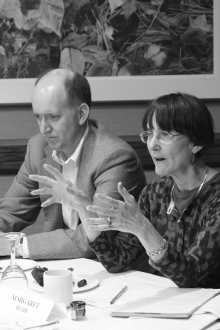Corporations and American Democracy
The Supreme Court’s 2010 decision in Citizens United v. FEC reignited impassioned debate on how accountable corporations are, and should be, to the democracy. As we think now about the proper role of the corporation in the political process, guidance from the past could prove especially valuable. In fact, much of the Citizens United opinion was an extended debate between Justices Scalia and Stevens on the role of the corporation in American history. Remarkably, the two justices looked at the same limited body of historical work and reached opposite conclusions. The truth is that nobody knows the full history because it hasn’t been written.
What has been the role of the corporation in the history of the American democracy? In 2012, the Tobin Project launched a new research inquiry focused on this question, one critically important not only for understanding the Court’s decisions but also how healthy democracies can be created and maintained. Naomi Lamoreaux (Yale, Economics and History) and William Novak (University of Michigan Law School) signed on to lead this effort and in 2013 convened an initial group of scholars for a Tobin Project workshop. At a larger conference in 2014, scholars had the opportunity to discuss their work on the history of the corporation with policymakers, including Senator Elizabeth Warren and Federal Election Commissioner Ellen Weintraub. Research from these meetings forms the core of Corporations and American Democracy (Harvard University Press, 2017), which charts the evolving role of corporations in American democracy from their origins in the Founding Era to the large, multinational corporations of today.
The Tobin Project is excited about the prospect of enhancing the collective understanding of how corporations shape American politics, and this project is the first step in a broader undertaking at the Tobin Project on the History of American Democracy. By developing a stronger empirical understanding of the history of our democracy—and of what worked and what didn't for the economy, society, and polity—we hope to set the groundwork for more productive public discourse and policy in years to come.


